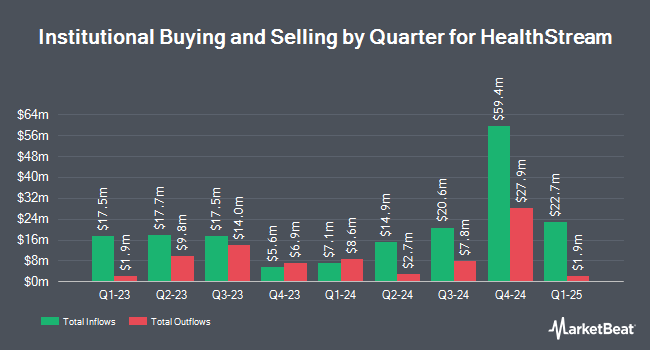Russell Investments Group Ltd. raised its position in shares of HealthStream, Inc. (NASDAQ:HSTM - Free Report) by 152.1% in the 1st quarter, according to its most recent 13F filing with the Securities & Exchange Commission. The firm owned 19,368 shares of the technology company's stock after buying an additional 11,685 shares during the period. Russell Investments Group Ltd. owned about 0.06% of HealthStream worth $622,000 at the end of the most recent reporting period.
Other large investors have also added to or reduced their stakes in the company. Diversified Trust Co raised its stake in shares of HealthStream by 5.0% during the first quarter. Diversified Trust Co now owns 9,174 shares of the technology company's stock valued at $295,000 after acquiring an additional 441 shares during the last quarter. GAMMA Investing LLC lifted its holdings in HealthStream by 30.8% in the 1st quarter. GAMMA Investing LLC now owns 2,082 shares of the technology company's stock worth $67,000 after buying an additional 490 shares during the period. First Horizon Advisors Inc. lifted its holdings in HealthStream by 99.6% in the 1st quarter. First Horizon Advisors Inc. now owns 1,056 shares of the technology company's stock worth $34,000 after buying an additional 527 shares during the period. Comerica Bank grew its position in shares of HealthStream by 7.1% in the 4th quarter. Comerica Bank now owns 9,373 shares of the technology company's stock worth $298,000 after buying an additional 618 shares during the last quarter. Finally, PNC Financial Services Group Inc. increased its stake in shares of HealthStream by 62.5% during the first quarter. PNC Financial Services Group Inc. now owns 2,625 shares of the technology company's stock valued at $84,000 after buying an additional 1,010 shares during the period. Institutional investors own 69.58% of the company's stock.
HealthStream Stock Performance
Shares of NASDAQ HSTM traded up $0.14 during mid-day trading on Thursday, hitting $28.20. 121,555 shares of the stock traded hands, compared to its average volume of 178,706. HealthStream, Inc. has a 52 week low of $25.36 and a 52 week high of $34.24. The company has a market cap of $835.85 million, a price-to-earnings ratio of 42.09, a PEG ratio of 3.52 and a beta of 0.47. The stock has a fifty day moving average price of $27.02 and a 200-day moving average price of $29.30.
HealthStream (NASDAQ:HSTM - Get Free Report) last announced its quarterly earnings data on Monday, August 4th. The technology company reported $0.18 EPS for the quarter, beating the consensus estimate of $0.16 by $0.02. The business had revenue of $74.40 million during the quarter, compared to analyst estimates of $74.39 million. HealthStream had a return on equity of 5.70% and a net margin of 6.89%. HealthStream has set its FY 2025 guidance at EPS. As a group, sell-side analysts predict that HealthStream, Inc. will post 0.63 EPS for the current fiscal year.
HealthStream declared that its Board of Directors has initiated a share buyback plan on Thursday, May 8th that authorizes the company to buyback $25.00 million in shares. This buyback authorization authorizes the technology company to reacquire up to 3% of its stock through open market purchases. Stock buyback plans are usually a sign that the company's management believes its shares are undervalued.
HealthStream Announces Dividend
The firm also recently disclosed a quarterly dividend, which was paid on Friday, August 29th. Shareholders of record on Monday, August 18th were issued a $0.031 dividend. This represents a $0.12 dividend on an annualized basis and a yield of 0.4%. The ex-dividend date was Monday, August 18th. HealthStream's dividend payout ratio is 17.91%.
Insider Buying and Selling at HealthStream
In other news, EVP Kevin P. O'hara sold 2,000 shares of HealthStream stock in a transaction that occurred on Wednesday, August 27th. The shares were sold at an average price of $27.97, for a total transaction of $55,940.00. Following the completion of the transaction, the executive vice president directly owned 17,137 shares in the company, valued at approximately $479,321.89. This trade represents a 10.45% decrease in their ownership of the stock. The transaction was disclosed in a document filed with the Securities & Exchange Commission, which is accessible through the SEC website. Corporate insiders own 20.50% of the company's stock.
Analysts Set New Price Targets
Separately, Canaccord Genuity Group cut their price target on shares of HealthStream from $29.00 to $28.00 and set a "hold" rating on the stock in a report on Thursday, August 7th. One research analyst has rated the stock with a Strong Buy rating, two have given a Buy rating and two have given a Hold rating to the company's stock. According to MarketBeat.com, HealthStream presently has a consensus rating of "Moderate Buy" and a consensus price target of $31.00.
Get Our Latest Report on HSTM
HealthStream Company Profile
(
Free Report)
HealthStream, Inc provides Software-as-a-Service (SaaS) based applications for healthcare organizations in the United States. The company's solutions help healthcare organizations in meeting their ongoing clinical development, talent management, training, education, assessment, competency management, safety and compliance, and scheduling, as well as provider credentialing, privileging, and enrollment needs.
Further Reading

Before you consider HealthStream, you'll want to hear this.
MarketBeat keeps track of Wall Street's top-rated and best performing research analysts and the stocks they recommend to their clients on a daily basis. MarketBeat has identified the five stocks that top analysts are quietly whispering to their clients to buy now before the broader market catches on... and HealthStream wasn't on the list.
While HealthStream currently has a Moderate Buy rating among analysts, top-rated analysts believe these five stocks are better buys.
View The Five Stocks Here
Discover the 10 Best High-Yield Dividend Stocks for 2025 and secure reliable income in uncertain markets. Download the report now to identify top dividend payers and avoid common yield traps.
Get This Free Report
Like this article? Share it with a colleague.
Link copied to clipboard.